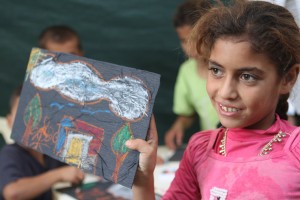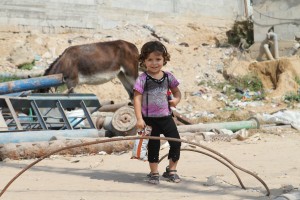Day five in Gaza: The women share stories of love and loss
By Gerri Haynes
(Gerri Haynes, a former president of Washington Physicians for Social Responsibility, is sending back reports from inside blockaded Gaza. As she did three times before, Gerri organized a team of doctors and other health care providers to work in hospitals and clinics in Gaza in an effort to directly help the people there and to bring attention to the ongoing humanitarian crisis that the Israeli blockade has created. Fifth in the series.)
This morning, I sat with a group of women whose family members have died. A dear friend in Washington state is interested in writing the stories of women in Gaza and I wondered if it would be possible to find women who might be willing to tell of their experience.
In brief, waiting for the fuller expression of their stories, these are the words I heard today:
Reem: My brother was killed in the Fakhoura massacre during the Cast Lead operation of 2008/2009. He had four children and after he was killed, his widow took the children to another part of Gaza and we no longer see them. We lost my brother and his whole family.
Amal: My child was five years old during Cast Lead. He was burned by white phosphorus and one year later, he died of cancer. There are many cases like this – children who were exposed to white phosphorus and who have now died of cancer. One day on the street, I heard other children calling a child by the name of my son – I began to cry, calling out his name again and again, “Hamza, Hamza, Hamza.”
Nahala: My husband and three of my children (two boys and one girl) were killed in the Fakhoura massacre. My daughter-in-law was also injured. Now I live with four sons and two daughters. One of my sons lost his legs – one above the knee and the other below the knee. Doctors have tried to help. He had artificial legs, but they didn’t fit and made him sore. Now he gets around in a wheel chair (note: there are very few handicapped-access places in Gaza) and needs more care. So much has happened. I find that I am very forgetful.
Amina: My son died in the massacre. He was 29 years old and had two boys and one girl. His wife married my son’s brother – our custom so that she will be cared for. Three of my children were injured. One of my sons has a neurological problem and a large hole in his leg. He needs care that isn’t available here. A doctor from another country came here and tried to help, but the problems of my son are now worse. Please see if you can help him.Asma: My husband died during the civil war in Gaza. We have one son who was one-year-old when my husband died. He is six now and has trouble with speech and he is hyperactive. I don’t know how to help him.
Khifa: My husband was 37 years old in 2006. He was standing in front of our house. Someone fired rockets into Israel and Israel fired back – my husband was killed. My two daughters are married and live with their husbands. My son is 16 and we live in a room in my father’s house. Soon, I will have to leave this house and I don’t know where we will go. I am physically and psychologically tired. My son is also very tired. We don’t know what will happen to us.
Eman: Two of my sons and my brother-in-law died in the massacre. At 3 AM, the Israelis called and told us to evacuate our home. When we were leaving the house the next day, we were attacked. Now my husband and I live with our four young children. One of my sons who was killed was older – he had been married for twenty days. I’m OK, but this is hard. My children have a hard time – they witnessed the killing. My husband doesn’t express his grief, but when he sees the children of my one son, he does cry. In one family I know, eleven people were killed.
Linda: My husband and fourteen-year-old son died in the massacre. I lost my home and now live in the home of my brother-in-law with my son and daughter – my brother-in-law lives abroad.
Nihad: Two of my sons died. I saw one of them die. I stay in my house with my family. My daughter-in-law lives with me.
The recent prisoner swap brought many feelings to these women. Together they told me that when they saw the released prisoners they were happy for the families, but wanted the same thing for those who died. As these women told their stories, a social worker from the agency where we met, listened and at the end of our time together, she spoke of having them meet together again to try to do some healing work.
RSS feed for comments on this post. TrackBack URI

